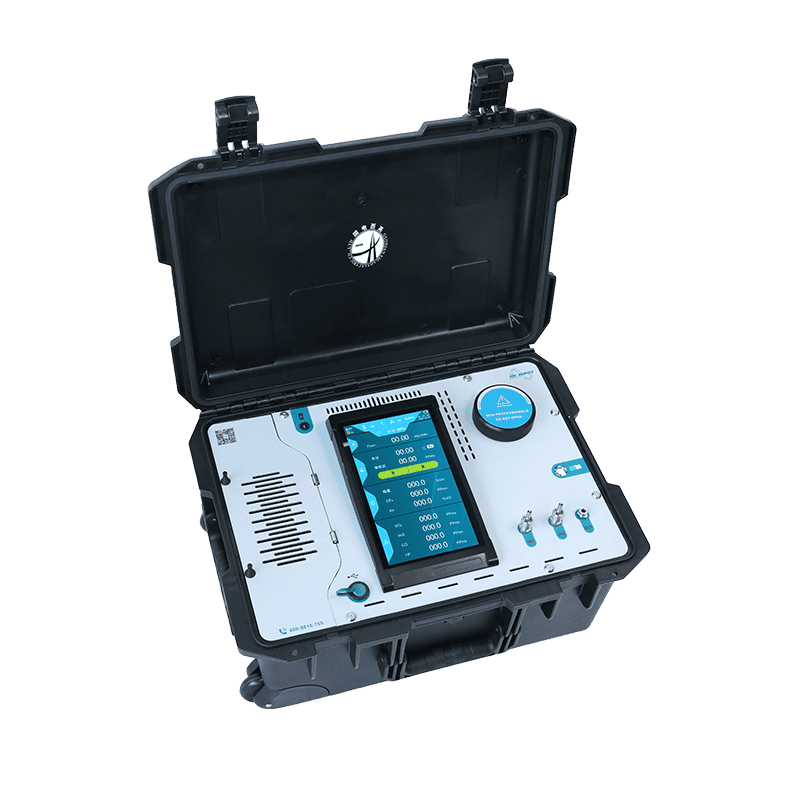SF6 (sulfur hexafluoride) is a gas widely used in the power industry, mainly in gas-insulated electrical equipment (GIS). Due to its excellent insulation and arc-extinguishing properties, SF6 is widely used in high-voltage and ultra-high-voltage electrical equipment. However, SF6 gas has an extremely serious impact on the environment, and its global warming potential (GWP) is 23,500 times that of carbon dioxide. Therefore, it is crucial to detect and repair SF6 leaks in a timely manner. This article will introduce 15 methods to detect SF6 gas leaks.
1. SF6 gas infrared spectroscopy
Infrared spectroscopy is a highly sensitive gas detection technology that uses the absorption characteristics of SF6 molecules to infrared light for detection. This method can detect leaks at a long distance and is suitable for monitoring large electrical equipment.
2. SF6 gas detector
Portable gas detectors are common tools for detecting SF6 leaks. These devices are usually equipped with sensors that can monitor gas concentrations in real time and issue alarms. The flexibility of gas detectors makes them suitable for on-site detection.
3. SF6 gas sampling method
The gas sampling method guides the gas sample to the analytical instrument for detection by setting up a sampling pipeline around the equipment. This method is suitable for detailed analysis of specific areas.
4. SF6 gas acoustic wave detection method
The acoustic wave detection method uses the propagation characteristics of sound waves in gas to detect the acoustic wave signals generated by gas leakage. This method can be used in complex environments and is not interfered by other gases.
5. SF6 gas thermal imaging technology
Thermal imaging technology identifies leaks by detecting temperature changes on the surface of the equipment. SF6 gas leakage will cause abnormal changes in the surface temperature of the equipment, which can be detected by thermal imagers.
6. SF6 gas ultrasonic detection method
The ultrasonic detection method uses high-frequency sound wave signals captured by ultrasonic detectors to identify gas leaks. This method is particularly suitable for monitoring high-voltage equipment and can work effectively in noisy environments.
7. SF6 gas chemical analysis method
The chemical analysis method determines the concentration of SF6 by chemically analyzing the gas sample. This method usually requires laboratory equipment and is suitable for more precise measurements.
8. SF6 gas electronic nose technology
Electronic nose technology uses a set of sensors to simulate human sense of smell and can identify the composition and concentration of gas. Although it is in the research and development stage, it has great potential.
9. SF6 gas visual detection method
Visual detection method helps inspectors observe visible signs of gas leakage by using specialized visualization tools. This method is often used in combination with other technologies.
10. SF6 gas leakage simulation
Gas leakage simulation introduces a known concentration of SF6 gas into the equipment and observes its diffusion and leakage behavior. This method can help evaluate the sealing of the equipment.
11. SF6 gas fiber optic sensing technology
Fiber optic sensing technology uses fiber optic sensors to monitor temperature and pressure changes in the equipment to identify gas leaks. This method has the advantages of high sensitivity and real-time monitoring.
12. SF6 gas laser detection technology
Laser detection technology detects the presence of SF6 gas by irradiating the gas with a laser beam and analyzing the characteristics of the reflected light. This method has the ability of high precision and long-distance detection.
13. Portable infrared SF6 gas imager
The portable infrared imager is an efficient detection tool that can quickly scan the surface of the equipment and identify potential leaks. The device is easy to operate and suitable for field use.
14. Computational fluid dynamics (CFD) SF6 gas simulation
CFD simulation simulates the gas flow through a computer model to help predict the possibility and impact of leaks. This method is suitable for equipment evaluation in complex environments.
15. Field testing of SF6 gas
Field testing is to identify potential leaks by manually checking and testing the tightness of the equipment. Although this method is time-consuming, it is essential in some cases.
Detecting SF6 gas leaks is an important part of ensuring the safety of electrical equipment and environmental protection. Through the above 15 detection methods, leaks can be effectively identified and repaired to ensure the normal operation of equipment and the safety of the environment. With the development of technology, these detection methods will continue to improve and provide strong support for the sustainable development of the power industry.

Post time: Dec-02-2024
